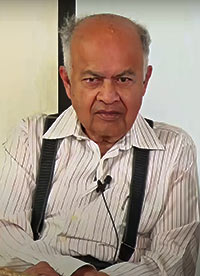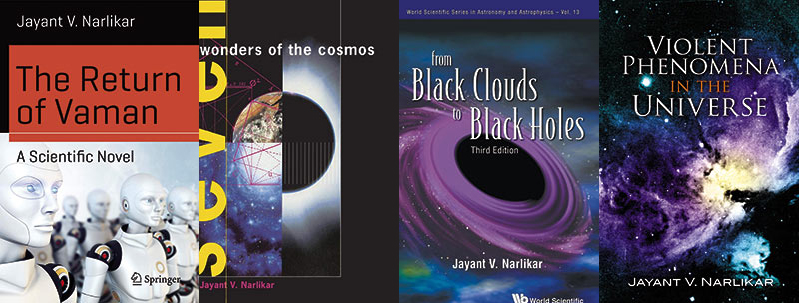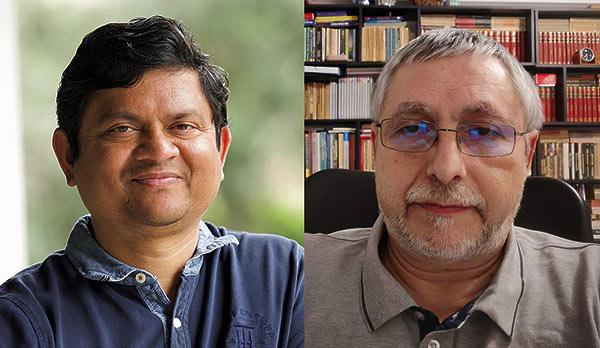SF in India

The 23rd Indian Association for Science Fiction Studies conference was held July 21, 2024. The highlights included a special guest lecture by renowned Romanian SF author George Dimitriu and scholarly presentations of papers on the theme ‘‘Spotlight on the Works of Professor Jayant V. Narlikar.’’
The conference began in the Indian traditional way, with the lighting of the lamp by the founding members of the association.

The event coincided with the celebration of the birthday of Professor Jayant V. Narlikar. Narlikar worked with Fred Hoyle on developing the Big Bang theory, and carried out research in the field of astrophysics. When he returned to India in the 1960s, he began promoting the science fiction genre by bringing together scientists and other professionals to popularize science and technology by publishing scholarly research papers, writing science fiction stories and novels, and delivering lectures. He began his venture in the Marathi and English languages. The writers, scientific community, and academicians joined together in the movement to represent various Indian languages and regions.
In a speech to the conference, Narlikar said the non-profit Indian Association for Science Fiction Studies, which recently celebrated its silver jubilee year, is fully dedicated to the promotion and development of research in the field of science fiction. The organization has also attempted to provide a platform for authors to present self-authored SF stories and scholars to present papers in its past 22 conferences. He expressed his happiness over the systematic documentation of these events on their official website.
He said that he was deeply moved and would remain grateful to the association for celebrating his birthday as ‘‘Indian Science Fiction Day.’’ He wished the association’s latest conference to be a grand success, and gave the organisers, speakers, and participants his blessings. Concluding his message, he expressed his wish to see Indian science fiction reach great heights in the days to come.

Our keynote speaker Ashish Mahabal is the deputy director at the Center for Data Driven Discovery at Caltech/The Inter-University Centre for Astronomy and Astrophysics (IUCAA) in the USA, but his passion is writing science fiction in English and Marathi. He has been a disciple of Professor Narlikar since 1990. While delivering his keynote address, he spoke about Narlikar’s academic background, IUCAA, and science fiction.
He explained that Professor Narlikar earned his BS at Benares Hindu University, Varanasi, Uttara Pradesh in 1957, and his BA, MA, PhD, and DS from Cambridge University, studying for his doctorate under the guidance of Fred Hoyle. He worked in Tata Institute of Fundamental Research, and was the founding director of the Inter-University Centre for Astronomy and Astrophysics at Pune in India. He won the prestigious Padma Bhushan award at the age of 26, and won the Padma Vibhushan in 2004. He has been a professor emeritus since 2003. Narlikar taught in the field of astrophysics and fostered an innovative learning atmosphere. He encouraged his students to solve mathematical puzzles, discuss political topics, and briefly summarize complex issues, teaching them to consider the same issues from various angles. Narlikar, a rationalist at heart, has penned a number of scholarly books and delivered a series of special lectures on a variety of scientific topics.
Mahabal concluded that the professor placed honesty above loyalty. His rationalistic attitude applied not only to the field of science but to all aspects of life, including fiction writing. He congratulated the professor for having ‘‘completed one more orbit around the Sun.’’
Romanian SF writer George Dimitriu delivered a special lecture on the topic ‘‘Planetary Society.’’ Dimitriu has published 43 works in India, Canada, Germany, Spain, the USA, and elsewhere. In his talk, he imagined a utopian future human world with perfect harmony among different classes of people and robots equipped with artificial intelligence. The genetically advanced human race confronts problems with advanced technology and are successful in colonizing the Moon and Mars.

Chairperson Ayesha Era Natarasan is an icon among Tamil SF writers, having published over 150 works and being honored with the Sahitya Academy Award for children’s literature. He observed that SF writing in India has reached new heights. Indian SF writing has dealt with themes including alien encounters, machine-human symbiosis, cli-fi, and expanded spatial and temporal horizons. While discussing the long history of Indian SF, he highlighted the contributions by Satyajit Ray in the Bengali language and by Sujatha in the Tamil language.
Natarasan talked about reading the Romanian magazine Tokara (‘‘to discover’’), which provided him with enough information to discuss the status of Romania’s SF field. He complimented the early contributions of Romanian scientists to the automobile industry the development of the fountain pen, and discussed a few notable Romanian works of SF. He concluded by saying that artificial intelligence is overpowering human intelligence, and cautioned that humans should only use artificial intelligence as a tool.
The association is devoted to promoting and developing research in the field of science fiction, and had a program of paper presentations by eminent SF scholars during the conference, with a focus on the works of Jayant V. Narlikar. Presentations included: ‘‘The Return of Vaman: A Critical Study’’ by Hrishikesh Barua; ‘‘The Scientific Elements in Narlikar’s The Return of Vaman’’ by Dr. Klinsa Kurien; ‘‘Alternate Histories, Alternative Worlds: Narlikar’s ‘Adventure’’’ by Dr. Sami Ahmad Khan; ‘‘An Analytical Study of Tales of the Future: Ten Best Sci-Fi Stories by JV Narlikar’’ by Dr. Srinarahari MH; ‘‘Narlikar’s Science Journalism: Educating Ourselves on Antipathies of Science’’ by Mahima Kadiyan and Professor Amritha; ‘‘Exploring ‘The Comet’: A Short Story by Jayant Narlikar’’ by Dr. Sahana Prasad; and ‘‘Climate Change and Science Fiction: Insights from ‘The Ice Age Cometh’ by Jayant Narlikar’’ by Dipaliben Nayee and Dr. Paresh Joshi.
Dr. Barnali Chetia (of the department of linguistics at the Indian Institute of Information Technology in Gandhinagar, Gujarat state), gave her chairperson’s address, and remarked on the extraordinary effort taken to present classic scholarly works. She pointed out that, unlike with Western science fiction works, there are few secondary resources available in text or online platforms for Indian science fiction. In the absence of such reference works, she appreciated that the research supervisors have been helping their scholars produce exemplary work.

Dr. Purushothaman, a retired principal and founder and president of the association, gave the presidential address. He said the present conference is historic in its perspectives, and explained how Western SF impacts the research work carried out by Indian scholars, and how Western SF has inspired Indian writers to produce their own work. He mentioned a few Indian SF works that have been shortlisted for international awards, including The Calcutta Chromosome by Amitav Ghosh and The Ten Percent Thief by Lavanya Lakshminarayan. When Purushothaman was organizing the first conference, he thought of inviting Narlikar to be chief guest. At that time, the professor was an acclaimed astrophysicist SF writer, popular worldwide thanks to his work being made available in English. He echoed Narikar’s message that we should encourage pan-Indian writings.
Dr. Meenal Kale (of the humanities department at Yeshwant Rao Chavan’s College, Nagpur, Maharashtra state) and Dayanand (a graphic & VFX artist from Bangalore) gave joint thanks to by the organization’s founding members, advisory committee members, guest speaker George Dimitriu, keynote speaker Ashish Mahabal, chairpersons Era Natarasan and Dr. Barnali Chetia, and the paper presenters in making this event a grand success. Hemalatha S (a PhD scholar from Tamil Nadu) was Master of Ceremonies, and the welcome speech was given by Raghavendra Vanjari (grants officer at Flame University Pune and the organizing secretary of the conference).
Our online conference will be held November 17, 2024, and all are invited to participate. For details see the website.
–Srinarahari MH
 While you are here, please take a moment to support Locus with a one-time or recurring donation. We rely on reader donations to keep the magazine and site going, and would like to keep the site paywall free, but WE NEED YOUR FINANCIAL SUPPORT to continue quality coverage of the science fiction and fantasy field.
While you are here, please take a moment to support Locus with a one-time or recurring donation. We rely on reader donations to keep the magazine and site going, and would like to keep the site paywall free, but WE NEED YOUR FINANCIAL SUPPORT to continue quality coverage of the science fiction and fantasy field.
©Locus Magazine. Copyrighted material may not be republished without permission of LSFF.






